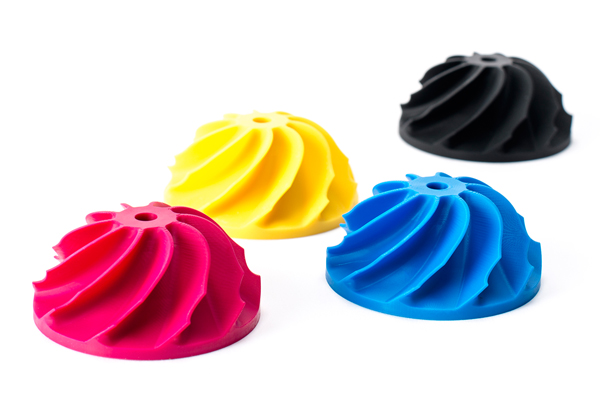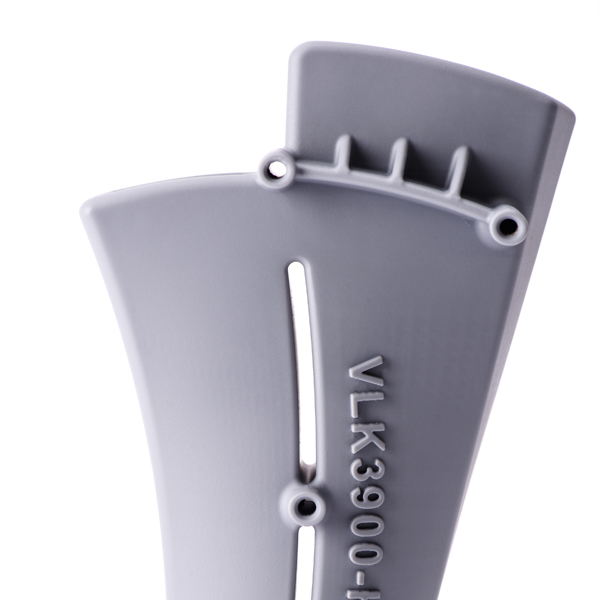Discover the versatility of methacrylate-based resins like UMA 90 and Vero materials, offering strength, detail, and aesthetic options for advanced manufacturing.

Below is an overview of the Methacrylate-Based Resins available and their unique advantages:
UMA 90 is a rigid, high-strength resin designed to meet the demands of functional components and prototypes. It delivers exceptional mechanical performance, making it ideal for applications requiring durability, stability, and load-bearing capabilities.
- Key Characteristics:
- High Strength and Rigidity: Withstands mechanical stress, ensuring parts maintain their shape and performance under load.
- Dimensional Stability: Provides precise, accurate parts with minimal deformation over time.
- Durability: Suitable for long-term use in testing and end-use applications.
- Ideal Applications:
- Automotive Components: Structural parts such as brackets, mounts, and enclosures.
- Industrial Tooling: Durable jigs, fixtures, and tooling for manufacturing processes.
- Medical Devices: Functional prototypes and housings for diagnostic equipment.
UMA 90’s combination of strength and precision makes it a versatile material for industries that demand high-performance functional parts.
The Vero family of materials offers a balance of versatility, aesthetics, and precision, making them ideal for creating visually appealing and highly detailed prototypes or final components. These materials are available in a range of monochrome colors (white, blue, black) to meet specific design and functional requirements.
- Key Characteristics:
- Smooth Surface Finish: Delivers professional-grade aesthetics with minimal post-processing.
- High Resolution and Detail: Optimized for additive manufacturing processes like PolyJet printing, ensuring intricate geometries and fine details.
- Color Variety: Offers flexibility in design with options for white, blue, and black, enabling easy prototyping and color-coded functional parts.
- Ideal Applications:
- Consumer Products: Concept models for electronics, wearables, and household goods with a polished finish.
- Medical Prototypes: Surgical guides, diagnostic models, and visually accurate device enclosures.
- Automotive and Aerospace: High-resolution prototypes for visual and functional testing, including interior trim and structural mockups.
Vero materials are particularly valued for their aesthetic flexibility and ability to produce realistic, high-quality prototypes that look and perform like final products.

UMA 90 and Vero materials are engineered to provide high tensile strength and rigidity, making them ideal for applications requiring load-bearing capabilities or functional prototypes. Their ability to withstand mechanical stress ensures reliability in testing and end-use scenarios.
- Why It Matters: Exceptional strength reduces the risk of failure during operational testing or use in demanding environments, providing confidence in product validation.
- Applications:
- Load-bearing prototypes for automotive brackets and mounts.
- Functional housings for consumer electronics under real-world conditions.
- Structural parts for industrial and aerospace applications.
Methacrylate-based resins are optimized for additive manufacturing processes, such as SLA and PolyJet printing, enabling the production of highly detailed, accurate parts with fine surface features. These materials are ideal for complex designs and intricate geometries.
- Why It Matters: High precision ensures that prototypes and components meet tight tolerances, improving the accuracy of design iterations and functional performance.
- Applications:
- Automotive and aerospace prototypes with intricate aerodynamic features.
- Consumer product models requiring detailed branding or functional features.
- Medical components like surgical guides or diagnostic tool prototypes.
Vero materials are known for their smooth surface finish and availability in multiple colors (white, blue, black), allowing for the creation of visually appealing prototypes and final parts. These materials are ideal for producing concept models that require a professional, polished appearance.
- Why It Matters: A high-quality surface finish reduces the need for extensive post-processing and enhances the aesthetic appeal of parts, especially for consumer-facing products.
- Applications:
- Visual models for product presentations and client approvals.
- Color-coded prototypes for easy identification of assembly components.
- Concept models for consumer electronics with a focus on appearance and functionality.
Methacrylate-based resins offer long-term mechanical integrity, even under mechanical stress or exposure to environmental factors like moisture and temperature fluctuations. This makes them suitable for both indoor and outdoor applications where reliability is essential.
- Why It Matters: Durability ensures that prototypes and functional parts can be used for extended testing or real-world applications without degradation.
- Applications:
- Functional components for outdoor enclosures or automotive interiors.
- Long-term jigs and fixtures used in industrial manufacturing.
- Parts for medical devices subjected to repeated sterilization or handling.
Methacrylate-based resins are highly adaptable to post-processing techniques, including sanding, polishing, and painting. This flexibility allows manufacturers to tailor the appearance and functionality of parts to meet specific design or branding requirements.
- Why It Matters: Post-processing flexibility ensures that parts not only perform well but also meet aesthetic and branding needs, enabling a seamless transition from prototype to production.
- Applications:
- Polished enclosures for high-end consumer electronics.
- Painted medical device housings for better visibility and branding.
- Sanded or textured surfaces for improved grip or aesthetic appeal in tools and fixtures.
In aerospace, methacrylate-based resins are used to create lightweight, high-precision prototypes that meet the industry’s stringent requirements for performance and durability.
- Lightweight, Rigid Prototypes for Wind Tunnel Testing and Structural Analysis
Materials like PerForm enable manufacturers to develop accurate aerodynamic models and components for wind tunnel testing. - Components Requiring a Smooth Finish for Aerodynamic Testing
Methacrylate resins provide the smooth surface finishes required for functional testing of airflow and drag in aircraft systems. - Applications:
- Aircraft interior components: Lightweight yet durable prototypes for cabin designs.
- Aerodynamic models: Scaled-down parts for airflow analysis.
- Assembly jigs: Custom tools for accurate assembly of aircraft components.
The automotive industry benefits from methacrylate-based resins for high-resolution prototypes and functional testing. These materials enable manufacturers to validate designs, improve part performance, and streamline development cycles.
- High-Resolution Prototypes for Design and Functional Testing
Materials like Accura (SI 60) and UMA 90 produce detailed prototypes that replicate the appearance and performance of final components. - Durable Brackets and Enclosures for Early-Stage Product Development
Methacrylate resins deliver the strength needed for parts subjected to functional testing, such as load-bearing or fluid-handling applications. - Applications:
- Dashboard components: Instrument panels and control housings.
- Trim models: Interior and exterior trim pieces for design validation.
- Fluid-handling prototypes: Cooling system parts and fuel system components.
Methacrylate-based resins are widely used in the medical industry for their biocompatibility, precision, and sterilization compatibility. These materials enable manufacturers to create functional prototypes and components for testing, training, and final use.
- Functional and Sterilizable Prototypes for Testing and Validation
UMA 90 and BioClear resins allow the production of durable prototypes that withstand sterilization and repeated handling. - Transparent or Colored Components for Visual Aids and Training Models
Materials like WaterShed XC11122 provide clarity and precision for medical prototypes used in training or procedural simulations. - Applications:
- Diagnostic tool housings: Enclosures for monitoring devices or portable diagnostic equipment.
- Surgical guides: Accurate, sterilizable guides for complex medical procedures.
- Wearable device prototypes: Health monitoring systems and rehabilitation aids.
Methacrylate-based resins are versatile materials for industrial manufacturing, offering strength, precision, and durability for a wide range of components and tooling.
- Custom Tooling, Fixtures, and Jigs for Assembly and Production Lines
Resins like Evolve 128 and ProtoTherm 12120 allow the creation of high-strength jigs and fixtures, improving manufacturing efficiency and accuracy. - Durable Enclosures and Housings for Heavy-Duty Machinery Prototypes
Methacrylate materials provide robust and precise housings for industrial equipment, ensuring parts withstand harsh operating environments. - Applications:
- Industrial equipment components: Precision-fitted enclosures and protective covers.
- Structural prototypes: Durable prototypes for heavy-duty machinery.
- Assembly line fixtures: Custom jigs and alignment